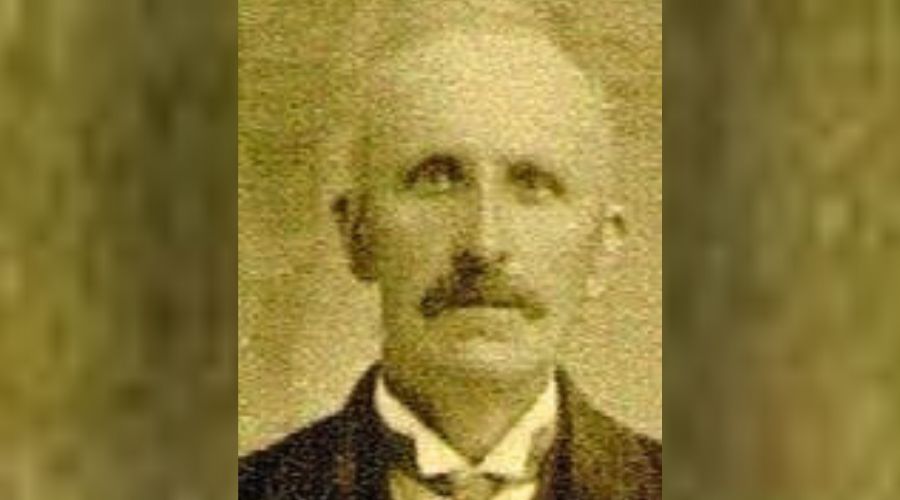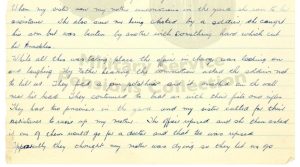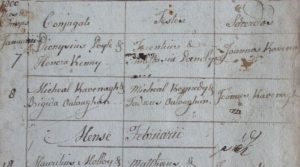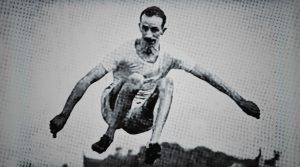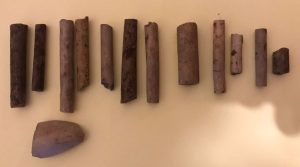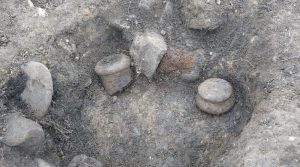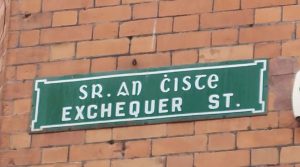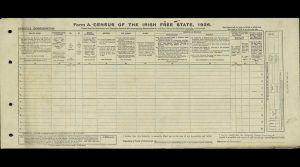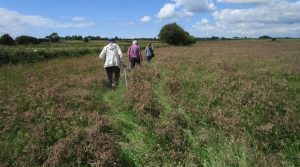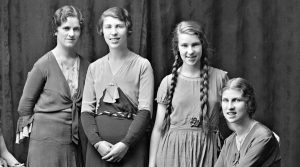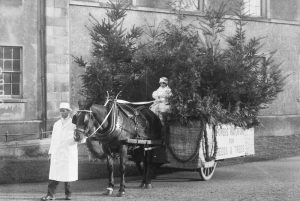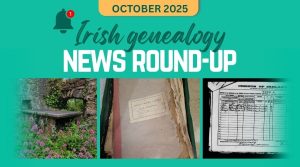By Geraldine McGovern
Leitrim-native Geraldine McGovern recounts the story of her maternal great-grandfather, Brian McEnroy, secretary of the Glenade Land League, who was an inmate in Sligo Gaol from 12 March to 6 June 1881. His incarceration resulted from one of the first prosecutions during the Land War in Ireland for “illegal assembly”.
Brian McEnroy was born c.1854 in the townland of Aghalateeve, near Glenade in north Co. Leitrim, to Catherine Rooney and Bryan McEnroy. Brian had at least two brothers and two sisters and was not the eldest son.
Glenade Land League demonstrations
The McEnroys were tenant farmers and when Brian was in his 20s, he served as secretary of the Glenade Land League. The Irish National Land League was established in 1879 to secure fair rents, tenant rights and land ownership reform, with the aim of ending Ireland’s exploitative landlord system under British rule. Brian was outspoken in his opposition to high rents and to the unfair eviction of tenants.
A D V E R T I S E M E N T
On 8 August 1880, a very large crowd from the surrounding districts gathered in Glenade for a land demonstration. The Royal Irish Constabulary (RIC) was also present in large numbers, along with a government reporter, which had become commonplace at all land meetings. Speaking in his capacity as secretary of the local Land League branch, Brian proposed the first resolution before an estimated 5,000 people, as reported by the Sligo Champion. This resolution pledged to abolish the existing land ownership system and replace it with one that would grant ownership to those who work the land.
A smaller gathering took place on 1 October in the townland of Cleighragh, where Brian was again present. He and other Glenade Land League members had organized a group to line the route a notorious landlord, Robert Corscadden, would travel on his way home from saving crops. This particular landlord had a reputation for rack-renting, frequent evictions and facilitating land-jobbing.
Kinlough Petty Sessions
14 October 1880
On Thursday, 14 October 1880, a case was heard at the Petty Sessions Court in Kinlough, Co. Leitrim, concerning the demonstration at the beginning of the month. Brian was one of 23 men charged and appeared before three justices: Beresford, Maloney and Dickson. The case was taken by the Crown, represented by Sub-Inspector Frederick A. Whyte of Manorhamilton and the cause of the complaint was as follows:
“That on the 1st day of October 1880 at Cleighragh in the County of Leitrim, the Defendant did unlawfully assemble with other persons, to the number of One hundred or more for the common purpose of driving Robert Corscadden of Hollymount, Manorhamilton, off his farm of Cleighragh aforesaid, and of preventing him from saving his crop of hay on his said farm aforesaid by their mumbling, turbulent gestures, shouting, groaning, and booing so as to endanger the Public Peace and to cause terror and alarm to her Majesty’s subjects.”
Sign up to our newsletter
Mr H.C. O’Doherty of Ballyshannon, Co. Donegal, represented the defendants, while Mr Croker, Sessional Crown Solicitor, prosecuted.
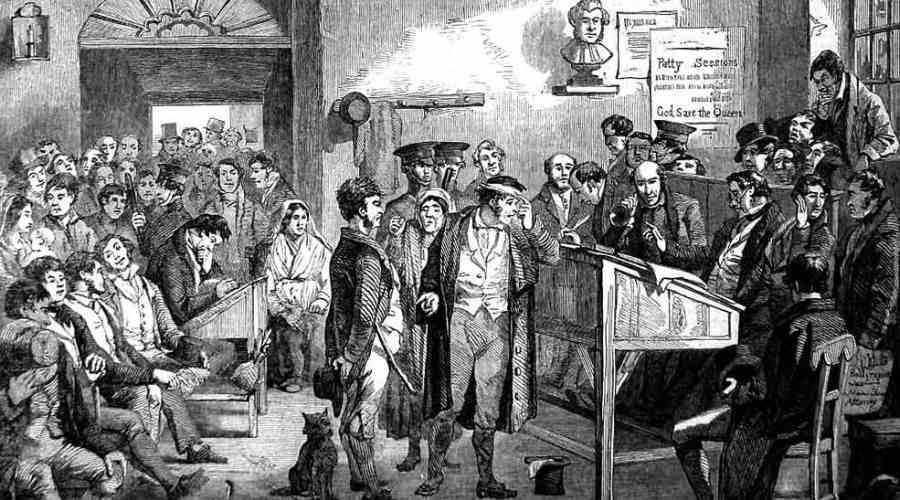
Before the case even went to trial, it had attracted attention in both the Irish and British media, with reports in the London Daily News on 13 October 1880 and the Wexford People on 16 October 1880 referring to the case as “the first prosecution under the police acts for illegal assembly”.
A huge crowd had gathered in the town of Kinlough for the court case, with many marching in procession four deep from the outlying districts of Glenade and Manorhamilton, wearing green laurel leaves and Land League membership cards in their hats. The RIC policemen, who were due to give evidence, had to march from Glenade due to a lack of available transport; this news was met with cheers from the crowd.
Back inside the court, Mr O’Doherty called for all of the cases against the defendants to be dismissed on the grounds that the court had not assembled until an hour after the appointed time. Mr Croker countered that two magistrates could make a court but went on to request an adjournment since two of the Crown’s witnesses, Robert Corscadden and his son Thomas, could not attend as explained in their affidavits.
The affidavits were then read out and described the great difficulty that Robert and Thomas Corscadden faced in procuring transportation from Manorhamilton to Kinlough for the court case. They also expressed the belief that their lives were in danger from the defendants if they appeared in court that day.
A D V E R T I S E M E N T
It was agreed that the case would be adjourned, leading to much discussion and argument from both sides about when and where the rescheduled court case would take place. Finally, it was agreed that the case would reconvene in Kinlough on the same day in a month’s time.
11–13 November 1880
The 23 defendants appeared at the Petty Sessions Court in Kinlough on Thursday, 11 November. This time, a number of horse-drawn cars were brought from Carrick-on-Shannon to Manorhamilton to transport the Corscadden witnesses to Kinlough. The local hotel proprietor had refused them accommodation, so Robert and Thomas Corscadden were “put up” in the police barracks for fear of “molestation”, though no attempts were made. About 150 policemen were deployed to the town in anticipation of disturbances, but none occurred.
A long column of men, numbering in the thousands, marched into the town from north Leitrim and south Donegal. The police considered closing the public houses, but the officers of the various Land League branches present, without being asked, went around and persuaded all the publicans to close.
At noon, the same three magistrates from the previous hearing took their seats on the bench. Several arguments ensued, with O’Doherty making every effort to have the case thrown out, but he was unsuccessful.
A large number of witnesses were called, including the two Corscaddens, the herdsmen who accompanied them on the day of the alleged incident and several RIC constables who arrived at the scene. It transpired that the Corscaddens were carrying two guns on the day, but none of the protesters had any weapons or stones and merely “groaned” at the landlords as they passed by.
A F F I L I A T E A D

O’Doherty then cross-examined Thomas Corscadden. He wished to get the particulars regarding the purchase of the land by the Corscaddens, their appropriation of the best part of the tenants’ farms, their raising of the rents on the portion left to the tenants and the eviction of those who were unable to pay the increased rent.
The hearing continued over the next two days, Friday and Saturday, 12 and 13 November. Following O’Doherty’s advice, only those directly involved in the case came into Kinlough on those days. He believed it could be misconstrued that the thousands who marched into the town on the Thursday were attempting to overawe the magistrates.
Robert Corscadden was the final witness called. He stated that he could not identify any of the defendants as being present at Cleighragh on the day in question. In cross-examination, O’Doherty asked him about the ten occupiers (tenants) who were on the land when he purchased it and why only three remained.
A very heated exchange ensued, during which O’Doherty gave specific examples of tenants being overcharged rent, irregularities in the issuing of receipts and the omission of “gales on them”. He also cited instances of unfair evictions and the failure to conduct proper valuations.
| “worst tenants in the county”
Towards the end of his testimony, Robert Corscadden claimed that the tenants on his property were becoming the “worst tenants in the county”. O’Doherty responded, “Yes, and it is the like of you that gets other landlords cursed”.
This concluded the evidence. As a result of eight defendants not being identified by the witnesses and one instance of bad service of summons, the magistrates decided to send 14 defendants of the 23 to the next Leitrim Assizes at Carrick-on-Shannon. Brian McEnroy was among the 14.
Judge Maloney expressed his satisfaction with how quietly the case had gone off and commended O’Doherty for his handling of it.
A D V E R T I S E M E N T
Leitrim Assizes
10 March 1881
Lord Justice Fitzgibbon was the presiding judge at the Spring Leitrim Assizes held in the courthouse in Carrick-on-Shannon on 10 March 1881. Sergeant Robinson and Mr MacDermott were counsel for the Crown (instructed by Mr Peyton, Crown Solicitor). This time, the 14 defendants were represented by Mr Nolan and Mr Stritch (instructed by Mr O’Doherty).
In addition to Brian McEnroy, the other 13 defendants were Loughlin Clancy, Patrick Clancy, Bryan McGowan, John McGowan, Patrick McNulty, Patrick Gaffney, Peter McNulty, Denis Gilroy, William Grimes, Denis Clancy, Edward McGoey, William Gallagher and John McGloin.
Please help support
Irish Heritage News
A small independent start-up in West Cork
Give as little as €2
Thank You
Sergeant Robinson opened the case and gave his account of the background leading to the events on 1 October 1880. After, Thomas Corscadden was examined; “he deposed to the state of facts narrated by counsel” and gave further information about the day in question. Robert Corscadden was then examined and gave similar evidence. The various sub-constables who were with the Corscaddens on 1 October gave corroborative evidence. The two servants of the Corscaddens, Irvine and Harte, also testified and this closed the case for the Crown.
Mr Nolan then addressed the jury on behalf of the defence. He pointed out that no one had been injured, no weapons had been used and no threats had been made, and that all that had occurred was some booing and cheering directed at a particular person. Nolan criticized the Crown’s conduct in challenging 40 jurors before a jury was finally sworn in to try the case. He expressed his hope that the jury would act impartially when considering the verdict. Mr MacDermott replied on behalf of the Crown.
A F F I L I A T E A D

Lord Justice Fitzgibbon then addressed the jury, advising them that they should not be influenced by certain arguments put forward. He noted that MacDermott had even gone so far as to urge the jury not to acquit the defendants if they had any regard for the peace and tranquillity of Co. Leitrim. Fitzgibbon went on to review the evidence for the jury, reminding them that the defendants were charged not with rioting but with unlawful assembly. He then left the jury to consider their verdict.
The jury found seven of the defendants guilty – Loughlin Clancy, Patrick Clancy, Bryan McGowan, Patrick Gaffney, Edward McGoey, William Gallagher and Brian McEnroy – and acquitted the rest. A juror stated that they recommended mercy for those found guilty and when asked why, he replied that the many meetings held across Ireland may have led the men astray.
Fitzgibbon sentenced Brian McEnroy to three calendar months’ imprisonment with hard labour. He directed that at the end of the period, Brian had to find sureties himself in £20 and two sureties in £10 each, to keep the peace for three years. Two others, the Clancy brothers Loughlin and Patrick, were sentenced to lesser jail terms and ordered to provide sureties. The four others were required to enter into their own recognizances in £30 each, to come up for judgment when called upon.
A D V E R T I S E M E N T
Regarding their conviction for illegal assembly, it must be noted that no violence, verbal or physical, occurred at any of the Glenade Land League’s demonstrations, assemblies or gatherings. Co. Leitrim was, in fact, known for its relative lack of violence during the Land Wars and the subsequent War of Independence, with locals opting for demonstrations and boycotts to express their opposition to unfair treatment by landlords.
The penalties imposed on Brian and the other six found guilty were particularly harsh considering the peaceful nature of their protests. This case highlights how the law was being used to crack down on the Land League and its activities during this turbulent period.
Imprisonment in Carrick-on-Shannon Gaol
Brian McEnroy, Loughlin Clancy and Patrick Clancy, the three men sentenced to serve time in prison, spent two nights in Carrick-on-Shannon Gaol. They were led from the courthouse in Carrick-on-Shannon through an underground tunnel (which still exists today and can be seen to the left of “The Dock” building) and were admitted to the gaol at 7.06pm. They were given six meals during their time there.
Imprisonment in Sligo Gaol
At 12.40am on 12 March 1881, Brian McEnroy, Loughlin Clancy and Patrick Clancy were transferred to Sligo Gaol, where they completed their sentences. It has been handed down through the family that Brian was put on the treadmill while imprisoned, which correlates with the “hard labour” part of his sentence. The treadmill was used to draw water from the Garavogue River to fill the tanks needed for the sanitation of the prison.
>>> RELATED: Life behind bars in Sligo Gaol

Brian was released on 6 June 1881 and soon resumed his role as secretary of the Glenade Land League.
Notes:
This article is a summary of a longer piece that was published in Breifne: Journal of Cumann Seanchais Bhreifne (2023).
In some sources, Brian McEnroy (c.1854–1932) is recorded as Bryan McEnroy. His birth date was determined using his baptism record and his age noted on his death record. His baptism, dated 9 August 1854, is recorded in the Cloonclare Roman Catholic parish registers, along with details of his siblings’ baptisms and his parents’ marriage banns record. The marriage banns record was sourced from the Leitrim Genealogy Centre.
The newspaper reports indicated that 23 men were charged in connection with the incident in Cleighragh on 1 October 1880, but only 22 men are listed in the petty session register from the proceedings at the Petty Sessions Court in Kinlough on 14 October 1880. The 22 men were as follows: Brian McEnroy, Dominick Rooney, Patrick Gaffney, Patrick McNulty, Owen Cullen, John McGowan, Hugh Gilroy Snr, Michael Tiffany, Patrick McGoey, John McGloin, Denis Gilroy, James Grimes, William Grimes, Peter McNulty, John Clancy, Patrick Clancy, Edward McGoey, Bryan McGowan, William Gallagher, Denis Clancy, John McGowan and John Rooney Jnr. Malachy Clancy’s name, though mentioned in the newspapers, does not appear in the registers. Loughlin Clancy was later added to the register from the proceedings on 11 November 1880. The Evening Telegraph on 13 November 1880 described a mix-up in the summons, and John Clancy’s son, Loughlin, was summoned instead.
Following the Leitrim Assizes on 10 March 1881 when Brian McEnroy was sentenced to three months’ imprisonment, the prison register for Carrick-on-Shannon states that Brian had to keep the peace for 12 months. The Sligo prison register refers to maturation of the sentence, payment of bail and reimprisonment for one month if he did not keep the peace.
Sources:
Daily Express, 11 Mar. 1881.
Daily News [London], 13 Oct. 1880.
Derry Journal, 15 Nov. 1880.
Evening Telegraph [Dublin], 12 & 13 Nov. 1880.
Ireland, Petty Session Court Registers, 1818–1919, Leitrim – Kinlough – 1871–1881, pp.682-86.
Ireland Prison Registers, 1790–1924: Carrick-on-Shannon Prison Register; Sligo Prison Register.
Irish Times, 13 Nov. 1880.
Leeds Mercury, 15 Oct. 1880.
Leitrim Advertiser, 18 Nov. 1880; 17 Mar. 1881.
Londonderry Sentinel, 16 Nov. 1880.
McGovern, G. 2023. ‘Brian McEnroy: an account of his role as secretary of the Glenade Land League 1880-1881 and the first prosecution under the police acts in Ireland for “illegal assembly”‘. Breifne: Journal of Cumann Seanchais Bhreifne 15:58, pp.444-66.
Northern Whig [Belfast], 13 Nov. 1880.
Roscommon and Leitrim Gazette, 12 Mar. 1881.
Sligo Champion, 14 Aug. 1880; 29 Nov. 1880.
Ulster Examiner, 16 Oct. 1880.
Wexford People, 16 Oct. 1880.
Acknowledgements:
My thanks are due to the Local Studies Section of Leitrim County Library in Ballinamore, Leitrim Genealogy Centre in Ballinamore, Carrick-on-Shannon Local History Centre and the Friends of Sligo Gaol.
Advertising Disclaimer: This article contains affiliate links. Irish Heritage News is an affiliate of FindMyPast and the British Newspaper Archive. We may earn commissions from qualifying purchases – this does not affect the amount you pay for your purchase.
READ NOW
➤ Golf’s early days in Sligo and its founding fathers
➤ The “Lady of the Lake”: Beezie and her island
➤ RIC barracks under siege in Clarinbridge and Oranmore, Co. Galway, during the Easter Rising
➤ Could Church Island be Yeats’ treasured “Lake Isle of Innisfree”?
A D V E R T I S E M E N T

